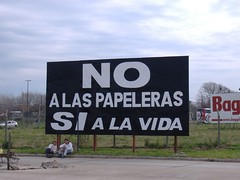 The residents of Gualeguaychú have resumed their blockade of International Road 136, which joins Argentina with Uruguay across the Uruguay River, in protest for the construction of two woodpulp and cellulose processing plants on the other side of the river.
The residents of Gualeguaychú have resumed their blockade of International Road 136, which joins Argentina with Uruguay across the Uruguay River, in protest for the construction of two woodpulp and cellulose processing plants on the other side of the river.
You might remember this from one of my first posts, when I told you about the decission of the International Court of Justice. For a long time Argentina and Uruguay have had a good relationship, but this issue has been eroding it since it started, a year and a half ago.
Uruguay has always been, to Argentinians, like another province of Argentina. We both like eating lots of beef and drinking mate. Uruguayans have come to Argentina and become part of our national culture, without any sort of conflict over nationality. Many middle-class porteños have spent countless summers in Punta del Este or visiting Colonia, and of course people from Entre Ríos have always crossed the river easily into Uruguay to visit Paysandú, Salto, or Fray Bentos. If it weren't for the porteño self-chosen aristocratic government of 19th century Argentina, who didn't like the federal and progressive ideas of Artigas and delivered the Eastern Bank into the hands of the Brazilian/Portuguese Empire, Uruguay would indeed be part of Argentina today, and I'm sure we'd be getting along fine. That may be a thing of the past.
Nobody wants a smelly paper mill to be near one's own town, least of all dumping its waste into one's own river. That's even if the waste is harmless and the smell is barely noticeable (which I doubt). The road blocks in Gualeguaychú and Colón were desperate measures. They worked to tell the national government that there was a problem. Now the solution should be legal and diplomatic, but the people over here are resorting to blocks again because they fear that the whole thing might end in inaction again. The Argentine government has reacted by washing its own hands clean of any blame, essentially telling the Environmental Assembly of Gualeguaychú that the harm done is their problem.
Summer's coming fast, and many Argentinians will want to vacation in Uruguay. There are only so many ways to go there: by boat from Buenos Aires (too expensive), or over one of three bridges, of which two are blocked, and the other is too far north for most tourists who won't bother going along a 300 km back-and-forth detour. If this goes on, it will hurt Uruguay, and our relationship to Uruguay. In the meantime, the cellulose plants managed by foreign companies (one Finnish, one Spanish, none allowed by law to install such plants in their own countries) will continue being built.
I went to Gualeguaychú in April. The city (it's not a small town as Buenos Aires media have called it, but a city of 70,000, and a beatiful city at that) was calm, waiting for things to develop, but always alert. The slogan No a las papeleras was everywhere, even in a huge sign that you find immediately as you step out of the bus terminal station. The people are organized and don't want to stop the fight. I was hoping to visit Gualeguaychú and to cross over to Fray Bentos, which I haven't been to, one of these days; I fear I won't be able to. I fear that if I go to Fray Bentos and spend my money on souvenirs there, where the huge chimney of Metsä-Botnia's cellulose plant can be already up in the distance, I'll be betraying those who campaign for ecology, for the right to clean air and clean waters. Or worse, that I'll get hostile looks from people when I tell them I'm an Argentinian. Funny, because we look all quite alike; only my accent might tell them I come from "the other side". I hope we don't come to that, ever.
15 October 2006
No a las papeleras
Subscribe to:
Post Comments (Atom)













No comments:
Post a Comment
Note: Only a member of this blog may post a comment.